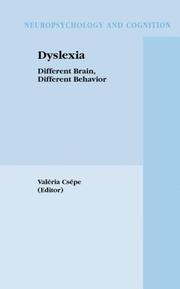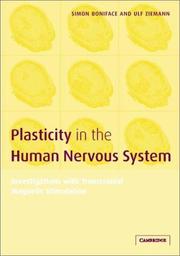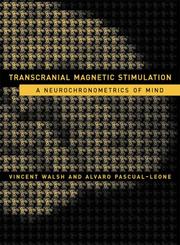| Listing 1 - 3 of 3 |
Sort by
|

Abstract | Keywords | Export | Availability | Bookmark
 Loading...
Loading...Choose an application
- Reference Manager
- EndNote
- RefWorks (Direct export to RefWorks)
Dyslexia --- Pathophysiology --- Evoked potentials (Electrophysiology) --- Brain --- #KVHB:Dyslexie --- #KVHB:Neuropsychologie --- Cortical evoked potentials --- Event-related brain potentials --- Event-related potentials (Electrophysiology) --- Evoked cortical potentials --- Electroencephalography --- Electrophysiology --- Developmental dyslexia --- Word-blindness, Partial --- Language disorders --- Reading disability --- Alexia --- Cerebrum --- Mind --- Central nervous system --- Head

ISBN: 9780511544903 9780521807272 9780521114462 0521807271 0511063857 9780511063855 0511072317 9780511072314 0511119852 9780511119859 0511544901 1107131464 9781107131460 1280160888 9781280160882 9786610160884 6610160880 1139147412 9781139147415 0511057520 9780511057526 0511306423 9780511306426 0521114462 Year: 2003 Publisher: Cambridge ; New York : Cambridge University Press,
Abstract | Keywords | Export | Availability | Bookmark
 Loading...
Loading...Choose an application
- Reference Manager
- EndNote
- RefWorks (Direct export to RefWorks)
It is now well known that the functional organisation of the cerebral cortex is plastic and that changes in organisation occur throughout life in response to normal and abnormal experience. Transcranial magnetic stimulation (TMS) is a non-invasive and painless technique that has opened up completely new and fascinating avenues to study neural plasticity. First, TMS can be used to detect changes in excitability or connectivity of the stimulated cortex which may have occurred through processes such as learning or recovery from a lesion. Second, repeated TMS by itself can induce changes in excitability and connectivity of the stimulated cortex which may be used therapeutically in neurological and psychiatric disease. Third, TMS can induce short-lasting 'virtual lesions', which may directly test the functional relevance of brain plasticity. Current knowledge of all these exciting possibilities is brought together in this book, written by the world's leading experts in the field. The book is an essential compendium on plasticity of the human brain for clinical neurophysiologists, neurologists, psychiatrists and neuroscientists.
Neuroplasticity. --- Magnetic brain stimulation. --- Magnetic stimulation of the brain --- Transcranial magnetic stimulation --- Brain stimulation --- Evoked potentials (Electrophysiology) --- Nervous system plasticity --- Neural adaptation --- Neural plasticity --- Neuronal adaptation --- Neuronal plasticity --- Plasticity, Nervous system --- Soft-wired nervous system --- Synaptic plasticity --- Adaptation (Physiology) --- Neurophysiology --- Developmental neurobiology

ISBN: 0262731746 0262232286 0262285738 0585481393 9780262285735 9780585481395 9780262232289 9780262731744 0262232316 9780262232319 Year: 2003 Publisher: Cambridge, Mass. MIT Press
Abstract | Keywords | Export | Availability | Bookmark
 Loading...
Loading...Choose an application
- Reference Manager
- EndNote
- RefWorks (Direct export to RefWorks)
The mainstays of brain imaging techniques have been positron emission tomography (PET), functional magnetic resonance imaging (fMRI), magnetoencephalography (MEG), and event-related potentials (ERPs). These methods all record direct or indirect measures of brain activity and correlate the activity patterns with behavior. But to go beyond the correlations established by these techniques and prove the necessity of an area for a given function, cognitive neuroscientists need to be able to reverse engineer the brain--i.e., to selectively remove components from information processing and assess their impact on the output. This book is about transcranial magnetic stimulation (TMS), a technique that emerged during the same period as neuroimaging and has made it possible to reverse engineer the human brain's role in behavioral and cognitive functions. The subject areas that can be studied using TMS run the gamut of cognitive psychology--attention, perception, awareness, eye movements, action selection, memory, plasticity, language, numeracy, and priming. The book presents an overview of historical attempts at magnetic brain stimulation, ethical considerations of the technique's use, basic technical and practical information, the results of numerous TMS studies, and a discussion of the future of TMS in the armamentarium of cognitive neuropsychology.
Magnetics --- Neuropsychology --- Brain --- Cognition --- Diagnostic Imaging --- Diagnostic Techniques and Procedures --- Psychophysiology --- Mental Processes --- Physics --- Central Nervous System --- Physiology --- Diagnosis --- Natural Science Disciplines --- Behavioral Sciences --- Psychological Phenomena and Processes --- Nervous System --- Biological Science Disciplines --- Psychiatry and Psychology --- Analytical, Diagnostic and Therapeutic Techniques and Equipment --- Behavioral Disciplines and Activities --- Anatomy --- Disciplines and Occupations --- Neurology --- Medicine --- Health & Biological Sciences --- Magnetic brain stimulation. --- physiopathology. --- diagnostic use. --- physiology. --- methods. --- 159.95*1 --- 159.91 --- 159.95 --- Cognitieve psychologie --- Psychofysiologie. Neuropsychologie. Psychomotoriek. Psychomotorische therapie --- Geestelijke functies --- 159.95 Geestelijke functies --- 159.91 Psychofysiologie. Neuropsychologie. Psychomotoriek. Psychomotorische therapie --- 159.95*1 Cognitieve psychologie --- Anatomies --- Proxemics --- Behavioral Science --- Proxemic --- Science, Behavioral --- Sciences, Behavioral --- Natural Sciences --- Physical Sciences --- Discipline, Natural Science --- Disciplines, Natural Science --- Natural Science --- Natural Science Discipline --- Physical Science --- Science, Natural --- Science, Physical --- Sciences, Natural --- Sciences, Physical --- Antemortem Diagnosis --- Diagnoses and Examinations --- Examinations and Diagnoses --- Postmortem Diagnosis --- Antemortem Diagnoses --- Diagnoses --- Diagnoses, Antemortem --- Diagnoses, Postmortem --- Diagnosis, Antemortem --- Diagnosis, Postmortem --- Postmortem Diagnoses --- Disease --- Biologic Sciences --- Biological Science --- Science, Biological --- Sciences, Biological --- Biological Sciences --- Life Sciences --- Biologic Science --- Biological Science Discipline --- Discipline, Biological Science --- Disciplines, Biological Science --- Life Science --- Science Discipline, Biological --- Science Disciplines, Biological --- Science, Biologic --- Science, Life --- Sciences, Biologic --- Sciences, Life --- Nervous Systems --- System, Nervous --- Systems, Nervous --- Psychologic Processes and Principles --- Cerebrospinal Axis --- Axi, Cerebrospinal --- Axis, Cerebrospinal --- Central Nervous Systems --- Cerebrospinal Axi --- Nervous System, Central --- Nervous Systems, Central --- System, Central Nervous --- Systems, Central Nervous --- Physic --- Human Information Processing --- Information Processing, Human --- Mind-Body Relationship (Physiology) --- Physiologic Psychology --- Physiological Psychology --- Psychology, Physiologic --- Mind-Body Relations (Physiology) --- Psychology, Physiological --- Mind Body Relations (Physiology) --- Mind Body Relationship (Physiology) --- Mind-Body Relation (Physiology) --- Mind-Body Relationships (Physiology) --- Physiologic Psychologies --- Psychologies, Physiologic --- Relation, Mind-Body (Physiology) --- Relations, Mind-Body (Physiology) --- Relationship, Mind-Body (Physiology) --- Relationships, Mind-Body (Physiology) --- Diagnostic Technics and Procedures --- Technics and Procedures, Diagnostic --- Techniques and Procedures, Diagnostic --- Imaging, Diagnostic --- Imaging, Medical --- Medical Imaging --- Cognitive Function --- Cognitions --- Cognitive Functions --- Function, Cognitive --- Functions, Cognitive --- Encephalon --- Brains --- Encephalons --- Neuropsychologies --- Magnetic --- diagnosis --- methods --- Psychologic Processes --- Psychological Processes --- Phenomena, Psychological --- Processes, Psychologic --- Processes, Psychological --- Psychological Phenomenas --- Psychological Processe --- Psychosomatic Medicine --- Mind-Body Relations, Metaphysical --- Sensitivity and Specificity --- Radiologic and Imaging Nursing --- Image Processing, Computer-Assisted --- Neuropsychiatry --- Magnets --- Magnetic Phenomena --- Magnetic brain stimulation --- Magnetic stimulation of the brain --- Transcranial magnetic stimulation --- Brain stimulation --- Evoked potentials (Electrophysiology) --- Monetary policy --- Money --- NEUROSCIENCE/General
| Listing 1 - 3 of 3 |
Sort by
|

 Search
Search Feedback
Feedback About UniCat
About UniCat  Help
Help News
News